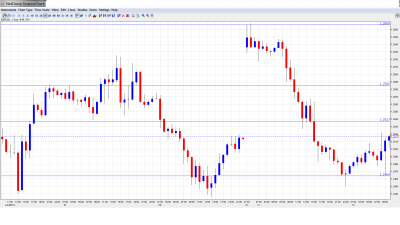The markets gave an initial thumbs-up to the weekend announcement of the Spanish bank bailout, but the euphoria quickly evaporated, as EUR/USD plunged almost two cents yesterday (June 11th). This declaration lacks details and the timing shows that it is a move intended to contain possible fallout from the next weeks’s elections in Greece. To add to this volatile mix, Italian issues remain on the agenda.
Here’s an update on technicals, fundamentals and what’s going on in the markets.
EUR/USD Technicals
- Asian session: The pair dropped to a low of 1.2450, and consolidated at 1.2490. The pair has edged upwards in the European session, and was trading at 1.2509.
- Current range: 1.2460 to 1.2540.
- Further levels in both directions: Below: 1.2460, 1.24, 1.2330, 1.22, 1.2144, 1.20, 1.1876 and 1.17.
- Above: 1.2540, 1.2587, 1.2623, 1.2660, 1.2760, 1.2814 and 1.2873.
- The failure of the pair to hold above the all important line of 1.2624 is a worrying sign for euro bulls.
- 1.2540 is the next line of resistance.
- 1.2460 is currently providing the pair with weak support.
Euro/Dollar edges upwards – click on the graph to enlarge.
EUR/USD Fundamentals
- 5:30 French Final Non-Farm Payrolls. Exp. +0.1%. Actual +0.1%.
- 12:30 US Import Prices. Exp. -1.0%.
- 14:00 US Economic Optimism. Exp. +49 points.
- 18:00 US Federal Budget Balance. Exp. -112.7 billion.
For more events and lines, see the Euro to dollar forecast
EUR/USD Sentiment
- Optimism over Spanish bailout fades fast: In an emergency session over the weekend, the Eurogroup announced a commitment to support Spanish banks by up to 100 billion euros. The precise amount of the bailout package will be determined after the results of independent banking audits are published later this month.There are 8 holes in the Spanish bailout, including the eventual sum of money, the sources and impacts on other countries, including Greece. Market euphoria is slowly drifting away, yet the Sunday gap is still open. The euro spiked following the announcement, but has since dropped sharply. As if the markets weren’t jittery enough about the Spanish financial crisis, on Monday the Fitch ratings agency downgraded the credit rating of Spain’s two largest international banks, Banco Santander and Banco Bilbao Vizcaya Argentaria, from A to BBB+.
- Italy next?: Spain is the euro-zone’s fourth largest country and the fourth country to get a bailout. Italy is the euro-area’s third largest and its debt to GDP ratio is much higher. Italy’s GDP declined by 0.8% in Q1, underlining concerns that economic growth in the EZ is stagnant, or worse. The markets may be focused on the crisis in Spain , but clearly Italy cannot hide behind Spain for too long.
- Little Likelihood of QE3: Fed Chairman Bernanke disappointed the markets with no hints about QE3. As always, he left the door open for any policy, and also mentioned a low risk of deflation. Nevertheless, his talk about a stabilizing housing market and diminishing returns for QE3, lowers the chances for action on June 20th, unless European troubles hit US shores in a horrible manner, but this is still to be seen.
- US recovery in trouble?: Recent US data continues to send mixed signals about the direction of the US economy. The Federal Budget Balance will be released later today, and the markets are bracing for a huge deficit for May. If the reading is worse than the market forecast, investors could react negatively, and the greenback could lose some ground.
- Greece’s Second Bailout Failed: The markets are keeping a watchful eye on the upcoming Greek elections, which could determine whether the country remains in the Euro-zone, and the results may also have a significant impact on world currency markets. However, given the faltering Greek economy, it may not matter who forms the next government. A third bailout for Greece could leave it in the EZ, but an exit is looking more and more certain. Greek pharmacies are unable to supply subsidized drugs, money is being taken out of the banks and the bigger problem is with tax payments: many Greeks are deferring tax payments and this weighs heavily on the state coffers, which are running dry. See how to trade the Grexit with EUR/USD.

